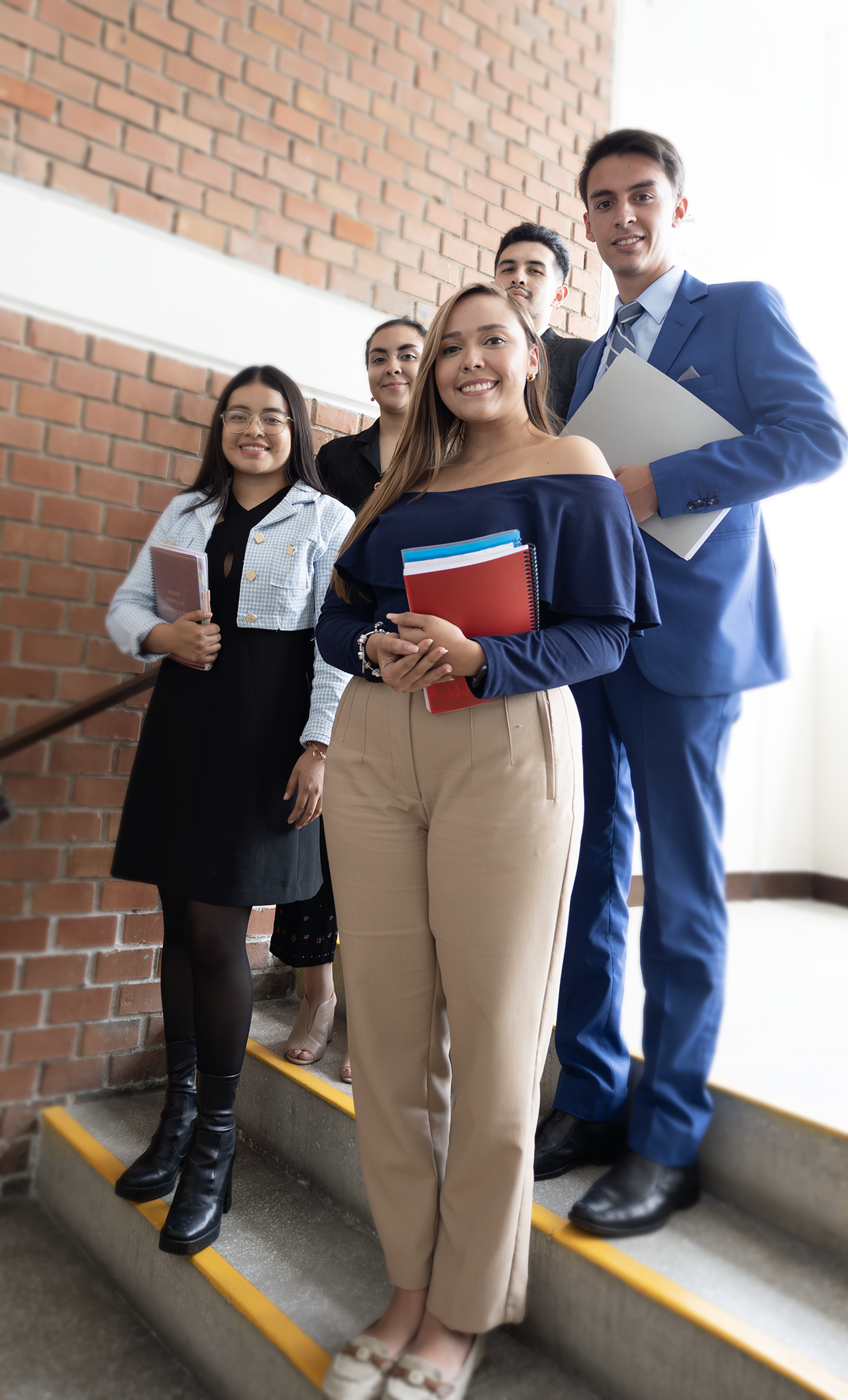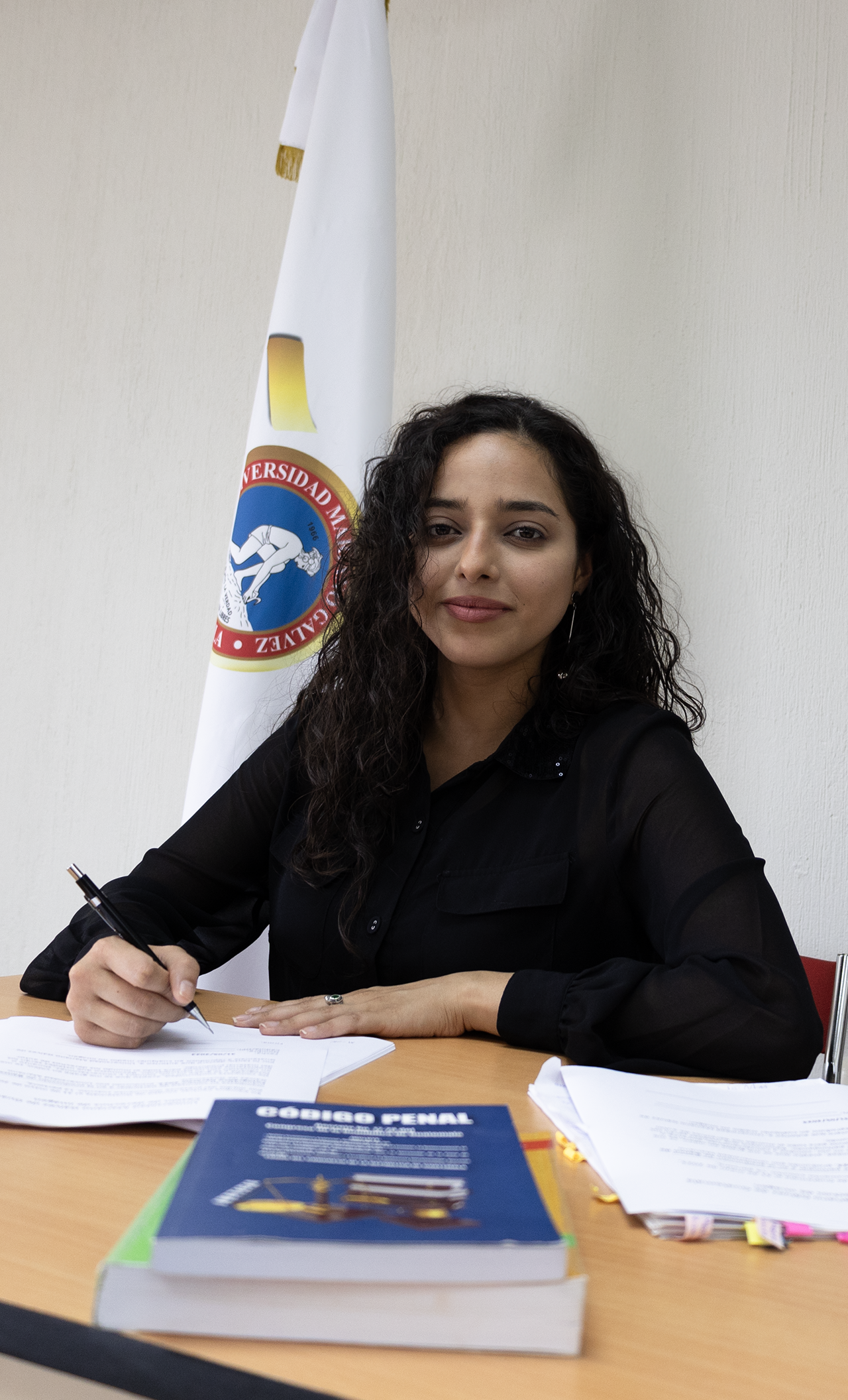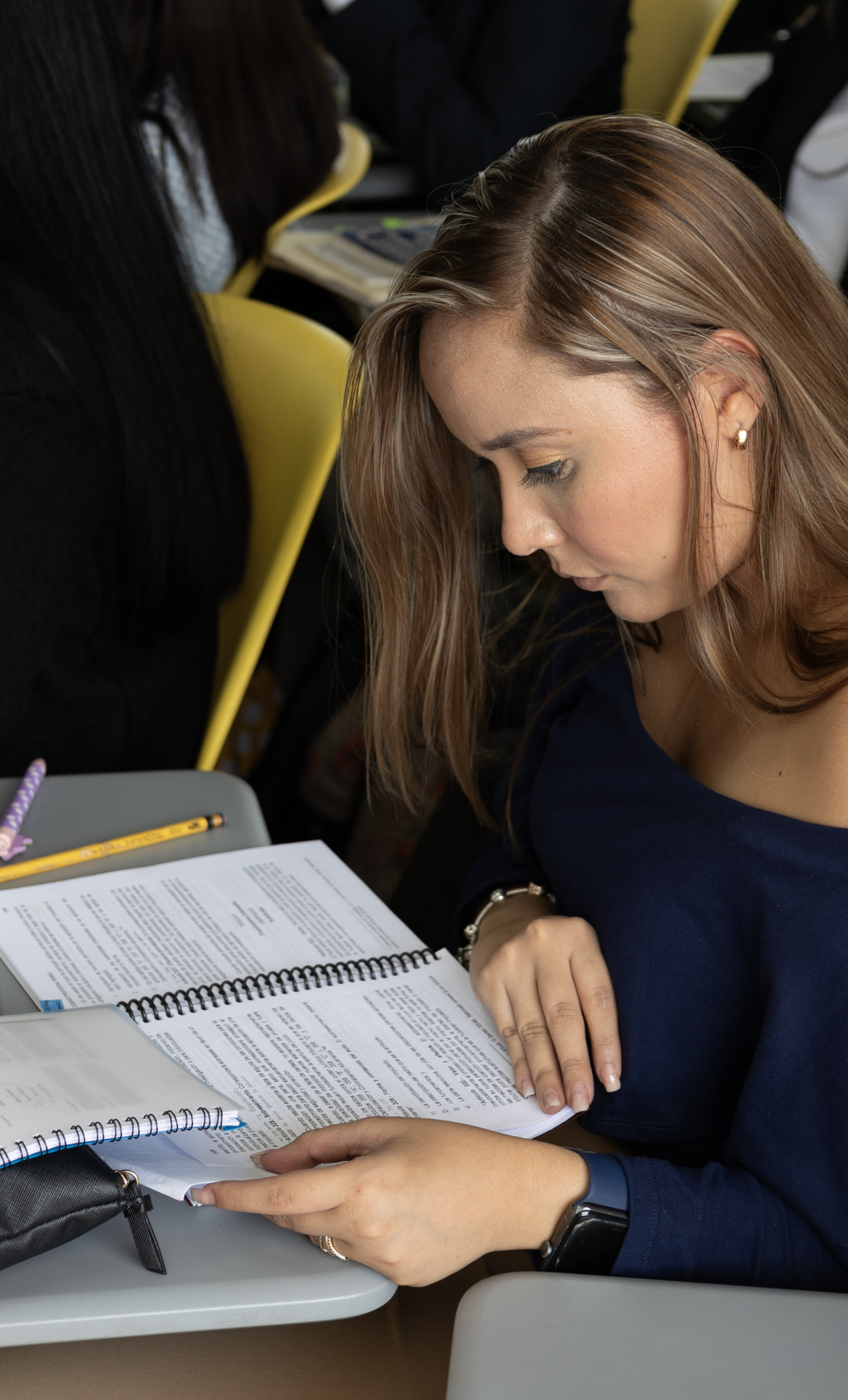
- Bachelor's Degree in
- Law and Social Sciences
- Degree to be obtained
- Degree in Law and Social Sciences
- Academic degree
- Bachelor's Degree
- Duration
- 5 years
- Modality
- In-person
- Schedule:
- All sessions
- Career description
-
The Bachelor's Degree in Legal and Social Sciences integrates the study of the legal institutions of Law, from the point of view of doctrine, legislation and jurisprudence; its application to the practical area and the strengthening of the competencies necessary for the practice of the profession of Lawyer and Notary; having as a transversal axis, internationalization, ethics, and human rights.
Objectives
To encourage students to develop a professional ethic, critical thinking regarding the national context, and an awareness that legal and social sciences are at the service of society.
To enhance students' awareness of national identity, promoting a culture of peace with a full understanding of their rights and responsibilities as citizens.
To equip students with in-depth knowledge of the legal and social sciences, providing them with the theoretical and practical tools to solve specific human problems through research. Technology and innovation.
To foster in future professionals a sense of responsibility, ensuring that their actions are in accordance with morality and ethics, in order to uphold the dignity of the institution of higher learning that has trained them.
To prepare professionals with a high academic level, training them to venture into the job market in the justice sector, public administration, private enterprise, and professional practice.
To generate actions aimed at establishing and consolidating a constitutional state governed by the law and a violence-free country, with the achievement of the common good as the supreme goal, thus ensuring that graduates of the faculty take part in the social, political, and economic development of the country.
To encourage graduates to study and pursue specialisation in legal and social sciences through the different postgraduate programmes, guiding them in the search for new knowledge in the internationalisation of the education system.
- What will you learn during the program?
-
The student will acquire theoretical and practical knowledge in all areas of law, from its philosophical and historical foundations to the application of Guatemalan procedural law, learning the theoretical-practical tools for the resolution of concrete cases, based on professional ethics and aware that the law is at the service of society.
Gallery
AdmissionProfile
Applicants should have the necessary skills, attitudes, abilities, and know-how:
- Ethical commitment and dedication to justice
- Reading comprehension skills
- Inductive and deductive reasoning
- Global and holistic perspectives
- Communication skills, oral and written argumentation
- Critical analysis skills
- Commitment to ethical and moral values applied to social realities
- Interest in the transformation of the social environment through professional practice based on respect for and protection of the human rights
- Ability to handle information and communication technologies
Graduate'sProfile
- Legal professionals will be able to analyse and apply the law to conflict resolution in pursuit of justice through a multidisciplinary approach
- They will be able to provide oral and written arguments based on legal principles, foundations and reasoning
- They will demonstrate mastery of effective communication and clear, persuasive expression in both oral and written forms. This is crucial for preparing legal documents and excelling in court
- Address different types of litigation in order to effectively prevent them and propose alternative dispute resolution mechanisms
- They will provide legal advice and representation in court proceedings
- Conduct research to transmit and generate legal knowledge, and use that knowledge to inform future legal decisions
- Use technological tools to manage legal information, research and communication
- Perform in different cultural and social contexts with a global vision
- Work in multidisciplinary teams to resolve conflicts in all areas of law
- Practice a high degree of ethics and responsibility, and be a responsible member of the community
Career Opportunities

No social activity can escape the legal system and the prevalence of law. Therefore, the scope of professionals in this discipline is practically unlimited. The work of legal professionals is universal since all areas of human activity involve interpreting, applying or creating legal regulations and provisions to some extent.
Lawyers, notaries and legal and social science graduates currently practise as attorneys, judges, magistrates or public prosecutors at national and local levels, engaging in representation, advisory and advocacy activities. They play a prominent role in the interpretation and application of legal norms in courts and in the administration and operation of those tribunals. They may also work in educational institutions and research organisations.
Additionally, legal professionals can pursue careers in the administration and execution of justice, as well as in human rights advocacy. However, current and future circumstances require the establishment of new courts, tribunals and legal commissions of national significance. Consequently, there is greater scope for the practice of law. Furthermore, the internationalisation of the national economy and its integration into the global marketplace demand that graduates are prepared to compete in the international arena.
Lawyers and attorneys can work independently or in partnership with other legal professionals, as well as those in other professional fields. They may also work in national or foreign law firms or as managers, advisers or collaborators in national and international companies, organisations and public or private institutions. They may also work in administrative roles or state activities entrusted to executive or legislative entities.
Curriculum
| 1° Ciclo | ECONOMÍA | FILOSOFÍA | INTRODUCCIÓN AL DERECHO I | LENGUAJE Y TÉCNICAS DE INVESTIGACIÓN | SOCIOLOGÍA DE GUATEMALA | |
|---|---|---|---|---|---|---|
| 2° Ciclo | CRIMINOLOGÍA | DERECHO PENAL I | DERECHO ROMANO Y ESPAÑOL | DESARROLLO HUMANO Y PROFESIONAL | INTRODUCCIÓN AL DERECHO II | TEORÍA GENERAL DEL ESTADO |
| 3° Ciclo | DERECHO CIVIL I | DERECHO CONSTITUCIONAL GUATEMALTECO | DERECHO PENAL II | MEDICINA FORENSE | TEORÍA GENERAL DEL PROCESO | |
| 4° Ciclo | DERECHO ADMINISTRATIVO I | DERECHO AMBIENTAL | DERECHO CIVIL II | DERECHO PENAL III | DERECHOS HUMANOS | LÓGICA JURÍDICA Y ÉTICA PROFESIONAL |
| 5° Ciclo | DERECHO ADMINISTRATIVO II | DERECHO CIVIL III | DERECHO DEL TRABAJO I | DERECHO FINANCIERO Y TRIBUTARIO | DERECHO PROCESAL PENAL I | ORATORIA FORENSE |
| 6° Ciclo | DERECHO CIVIL IV | DERECHO DEL TRABAJO II | DERECHO MERCANTIL I | DERECHO PROCESAL ADMINISTRATIVO | DERECHO PROCESAL PENAL II | |
| 7° Ciclo | CLÍNICA PROCESAL PENAL I | DERECHO CIVIL V | DERECHO MERCANTIL II | DERECHO NOTARIAL I | DERECHO PROCESAL DEL TRABAJO | SEMINARIO DE TRABAJO DE GRADUACIÓN |
| 8° Ciclo | CLÍNICA PROCESAL LABORAL | CLÍNICA PROCESAL PENAL II | DERECHO INTERNACIONAL PÚBLICO | DERECHO MERCANTIL III | DERECHO NOTARIAL II | DERECHO PROCESAL CIVIL Y MERCANTIL I |
| 9° Ciclo | CLÍNICA PROCESAL CIVIL I | DERECHO NOTARIAL III | DERECHO PROCESAL CIVIL Y MERCANTIL II | DERECHO PROCESAL CONSTITUCIONAL | DERECHO REGISTRAL | |
| 10° Ciclo | CLÍNICA PROCESAL CIVIL II | DERECHO BANCARIO Y BURSÁTIL | DERECHO INTERNACIONAL PRIVADO | DERECHO PROCESAL CIVIL Y MERCANTIL III | FILOSOFÍA DEL DERECHO |


